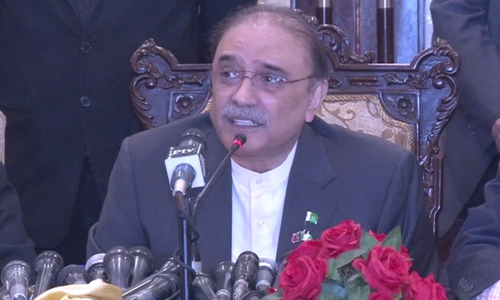GILGIT: Criticising the Pakistan Tehreek-i-Insaf (PTI) government, Pakistan Peoples Party (PPP) chairman Bilawal Bhutto-Zardari has said the country is passing through the biggest financial crisis in its history as prices of essential items are continuously rising and young people are not getting jobs.
Addressing a public gathering at the Aga Khan Shahi Polo Ground on Sunday, Mr Bhutto-Zardari said the PTI had promised to build five million houses but was actually snatching the roofs from above people’s heads by calling them encroachments.
“In Naya Pakistan, our life and property are not safe,” he said, adding that those wanting to build a new Pakistan had shaken the country’s foundations.
PPP chairman says PTI government has taken 100 U-turns even before completing 100 days in office
The PPP chief said the PTI government’s slogan of change started with a Rs41 billion cut in Gilgit-Baltistan development budget and a further reduction in subsidies on wheat.
“Roti is being sold for Rs10 and naan for Rs15. This is Naya Pakistan. The PPP will halt the ‘path of annihilation’,” he vowed.
He said that before coming to power, Prime Minister Imran Khan used to say that he would commit suicide rather than seeking loans from international donors, but now he was celebrating getting loans. “The PTI government has taken over 100 U-turns even before completion of first 100 days of its tenure. We would not let Pakistan become a ‘laboratory’,” he said.
Mr Bhutto-Zardari said the government which came to power by “stealing votes” was displaying sheer stubbornness and a “dark era” had been imposed on the masses. He said the PPP would provide political and constitutional rights to Gilgit-Baltistan after coming to power.
Mr Bhutto-Zardari, who arrived in Gilgit on Saturday on a five-day visit to GB, said the people of this region had defeated the Dogra Raj, liberated themselves and annexed the region with Pakistan unconditionally. The GB people, he added, had the courage higher than the Himalaya and strong like the Hindu Kush — a formidable mountain range.
He regretted that after the creation of Pakistan in 1947, the people of GB had been deprived of their fundamental rights. After liberation from the Dogra Raj, the GB people had been made target of tyranny and oppression by various powers, he said, adding that the region had been kept under darkness of the Frontier Crime Regulations-like black law till 1972.
“My family has special relations and love with the GB people for three generations. After my grandfather Zulfikar Ali Bhutto, mother Benazir Bhutto and father Asif Ali Zardari, now I have come here fulfilling this love,” he said.
Mr Bhutto-Zardari said PPP founder Zulfikar Bhutto was the first person to challenge the authority of local rulers (Rajas) in 1972, abolish the FCR, get the locals free from paying taxes to Rajas and introduce administrative and judicial reforms. Zulfikar Bhutto had also empowered the local people, initiated Karakoram highway project, introduced wheat subsidies for the locals, he said, adding that carrying on this agenda in 1994, former prime minister Benazir Bhutto had introduced new judicial and administrative reforms under the Legal Frame Work Order, 1994.
The PPP chairman said that when Benazir Bhutto had arrived in Pakistan after exile in 2007, she promised to empower the GB people. That promise, he added, was fulfilled by Asif Ali Zardari as president in 2009 in the shape of GB Empowerment and Self-Governance Order 2009.
Under the presidential order, he said, the GB people got their identity and the name of Northern Areas had been replaced with Gilgit-Baltistan. Under the order, he said, the GB people had been granted administrative provincial set-up and empowered to elect their own representatives and chief minister.
Mr Bhutto-Zardari said GB was gateway of the China-Pakistan Economic Corridor, but regretted that the rights and share of local people had been ignored in the mega project. He promised that the PPP would give constitutional and fundamental rights to the GB people after coming to power. The PPP would also ensure local people’s royalty in Diamer-Bhasha dam and oppose any move to shift the Sost dry port to other area, he said, adding that the right of local ownership of lands would be ensured.
He lashed out at the previous PML-N government in Islamabad and the incumbent government in GB for “attacks on GB’s autonomy” and alleged that the PML-N’s GB chief minister was trying to roll back the reforms carried out by the PPP. He accused the chief minister of appointing the activists of banned religious organisations in the GB police and trying to deprive the locals of their lands. He said the power to issue NOC to foreigners had been snatched from the GB government which damaged the tourism industry in the region.
Published in Dawn, November 19th, 2018













































